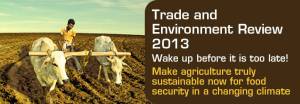Farming in rich and poor nations alike should shift from monoculture towards greater varieties of crops, reduced use of fertilizers and other inputs, greater support for small-scale farmers, and more locally focused production and consumption of food, a new UNCTAD report recommends.
The Trade and Environment Report 2013 warns that continuing rural poverty, persistent hunger around the world, growing populations, and mounting environmental concerns must be treated as a collective crisis. It says that urgent and far-reaching action is needed before climate change begins to cause major disruptions to agriculture, especially in developing countries.
The report, subtitled Wake up before it is too late: Make agriculture truly sustainable now for food security in a changing climate, was released today. More than 60 international experts contributed to the report’s analysis of the topic. The study notes that the sheer scale at which production methods would have to be modified under these proposals would pose considerable challenges. In addition, it would be necessary to correct existing imbalances between where food is produced and where it is needed, to reduce the power asymmetries that exist in agricultural input and food-processing markets, and to adjust current trade rules for agriculture.
The Trade and Environment Report 2013 recommends a rapid and significant shift away from “conventional, monoculture-based… industrial production” of food that depends heavily on external inputs such as fertilizer, agro-chemicals, and concentrate feed. Instead, it says that the goal should be “mosaics of sustainable regenerative production systems that also considerably improve the productivity of small-scale farmers and foster rural development”. The report stresses that governments must find ways to factor in and reward farmers for currently unpaid public goods they provide – such as clean water, soil and landscape preservation, protection of biodiversity, and recreation.
Climate change will drastically impact on agriculture, the report forecasts, primarily in the developing regions with the highest future population growth, such as sub-Saharan Africa and South Asia. Much slower agricultural productivity growth in the future and fast-rising populations in the most vulnerable regions will almost certainly worsen current problems with hunger, drought, rising food prices, and access to land. These pressures may easily lead to massive migrations, and to international tensions and conflicts over food and resources such as soil and water.
The report cites a number of trends that collectively suggest a mounting crisis:
• Food prices from 2011 to mid-2013 were almost 80 per cent higher than for the period 2003–2008;
• Global fertilizer use has increased by eight times over the past 40 years, although global cereal production has only doubled during that period;
• Growth rates in agricultural productivity have recently declined from 2 per cent per year to below 1 cent;
• Two types of irreparable environmental damage have already been caused by agriculture: nitrogen contamination of soil and water, and loss of biodiversity;
• Greenhouse gas emissions from agriculture are the single biggest source of global warming in the South. They also the fastest growing (along with emissions from transport);
• Foreign land acquisition in developing countries (often termed “land grabbing”) in recent years has amounted, in value, to between five and ten times the level of official development assistance.
Continue reading “United Nations Say Small-Scale Organic Farming Is The Future Of Food Production”
